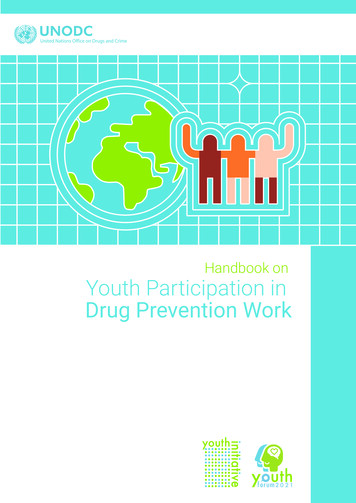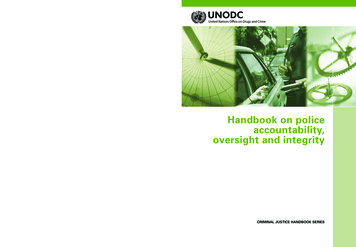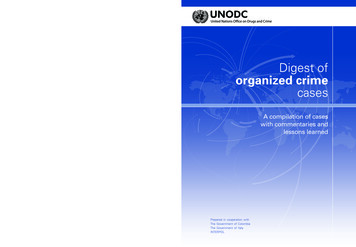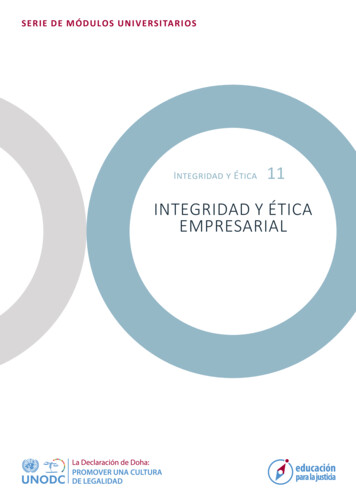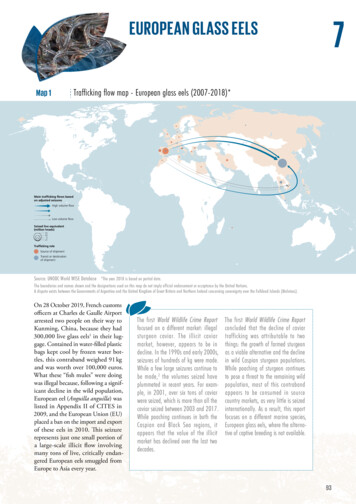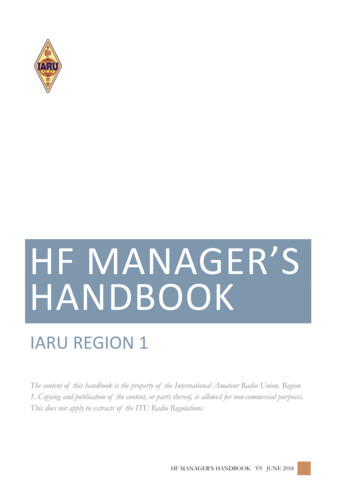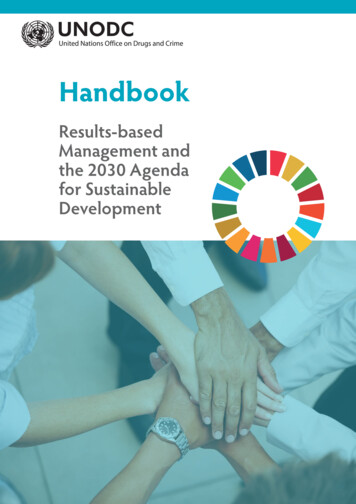
Transcription
HandbookResults-basedManagement andthe 2030 Agendafor SustainableDevelopment
Cover photo iStock.com/tadamichi
UNITED NATIONS OFFICE ON DRUGS AND CRIMEViennaHandbookResults-based Management and the2030 Agenda for Sustainable DevelopmentUNITED NATIONSVienna, 2018
United Nations, October 2018. All rights reserved.The designations employed and the presentation of material in this publication do not imply theexpression of any opinion whatsoever on the part of the Secretariat of the United Nationsconcerning the legal status of any country, territory, city or area, or of its authorities, or concerningthe delimitation of its frontiers or boundaries.Publishing production: English, Publishing and Library Section, United Nations Officeat Vienna.
AcknowledgementsThis Handbook was produced by the Strategic Planning and Inter-Agency Affairs Unit of thePublic Affairs and Policy Support Branch of the Division of Policy Analysis and Public Affairs of theUnited Nations Office on Drugs and Crime (UNODC).A number of staff members of the Strategic Planning and Inter-Agency Affairs Unit were involvedin the preparation of the Handbook. A first draft was written by Mario Hemmerling and ChristianClaassen and was further developed by Julia Weinstock (external consultant), under thesupervision of Gautam Babbar (Chief) with additional support and contributions provided byMónica Belalcazar, Nina Grellier and Fiona Hlavka.UNODC would like to thank field office staff at the Regional Office for Central Asia (ROCA), theCountry Office in Pakistan (COPAK), the Regional Office for Eastern Africa (ROEA), the CountryOffice in Colombia (COCOL), the Country Office in Peru (COPER), the Regional Office for SouthEast Asia and the Pacific (ROSEAP) and the Regional Office for West and Central Africa (ROSEN),for their valuable comments and suggestions during results-based management trainingworkshops carried out in 2017 and 2018 by the Strategic Planning and Inter-Agency Affairs Unitand the Staff Development Unit of the Human Resources Management Service of the UnitedNations Office at Vienna and UNODC. Much appreciated input was provided by KatharinaKayser (Independent Evaluation Unit in the Office of the Executive Director), Paúl FernandoCoellar Ríos (Country Office in the Plurinational State of Bolivia), Johana Liliana López Guevara(COCOL), Chikako Yoshida (COPAK), Gerson Hurtado Bergeth (ROSEAP), Wadih Maalouf (DrugPrevention and Health Branch of the Division for Operations) and Hanna Sands (Gender Team inthe Office of the Executive Director).UNODC gratefully acknowledges the generous funding provided by the Government of Swedenand its continued support to inculcate a culture of results-based management in line with the2030 Agenda for Sustainable Development into the programming efforts of the Office.iii
ContentsAcknowledgements Background I.iiiviiINTRODUCTION TO RESULTS-BASED MANAGEMENTA. What is results-based management? B. Why adopt results-based management? x12II. RESULTS-BASED MANAGEMENT STRATEGY OF THE UNITED NATIONS OFFICE ONDRUGS AND CRIME IN THE CONTEXT OF THE UNITED NATIONS STRATEGICFRAMEWORK AND THE 2030 AGENDA FOR SUSTAINABLE DEVELOPMENT 4A. Meeting the programme outcomes of the United Nations strategic framework 5B. Results-based management and the 2030 Agenda for Sustainable Development 5C. Translating results-based management into action: approach of the United NationsOffice on Drugs and Crime 8III. KEY CONCEPTS AND ELEMENTS IN RESULTS-BASED MANAGEMENT 10IV. RESULTS-BASED MANAGEMENT IN THE PLANNING PHASE 14A. Results-based management in the project and programme cycle 15B. Step 1: setting the vision 16C. Step 2: developing the theory of change 18D. Results framework: defining and formulating results within the theory of change 20E. Attribution, contribution and accountability 22F. Step 3: translating the theory of change into a log frame 23G. Inputs and activities: resources delivered through specific actions 26H. Project and programme outputs: changes in skills and abilities, or availabilityof new products and services 26I. Project and programme outcomes: changes in behaviours and practices 27J. Objective: meaningful long-term changes in behaviour, practices, benefits and/or lifeconditions 27K. Step 4: risks and assumptions in the log frame 28L. Step 5: performance indicators 29M. Step 6: means of verification 32N. Step 7: baseline and targets 32v
V.RESULTS-BASED MONITORING A. Monitoring for results B. Establishing the results-oriented performance monitoring framework C. Performance assessment D. Learning and lessons learned 3435363738VI. RESULTS-BASED REPORTING 40VII. EVALUATION 44A. Evaluation in the United Nations system and the Sustainable Development Goals 46B. Human rights and gender equality in the evaluation processes of the United NationsOffice on Drugs and Crime 47C. Evaluation and results-based management 47D. Evaluation in the project and programme cycle 48VIII. CONCLUSIONS 52ANNEXES 56Annex I. Sustainable Development Goals relevant to the mandate of the United NationsOffice on Drugs and Crime 57Annex II. The problem tree and the objective tree 58Annex III. Monitoring plan template 59Annex IV. Guided United Nations Office on Drugs and Crime log-frame template 60Annex V. Step-by-step guide to results-based management 62REFERENCES 64vi
BackgroundThe main purpose of the Handbook is to provide staff of the United Nations Office on Drugs andCrime (UNODC) with information that establishes a common ground and helps to ensure aconsolidated approach to programme planning, monitoring and reporting, at the national,regional and global levels, based on best practices in results-based management, within theoverall framework of the 2030 Agenda for Sustainable Development.The Handbook is intended to serve as a succinct, user-friendly resource that contains explanationsof key concepts and tools that will facilitate operationalizing harmonized results-basedmanagement approaches within UNODC as a means of achieving: Higher quality UNODC programmes and projects Improved ease, clarity and quality of reporting Greater alignment between UNODC programmes and projects with the 2030 Agenda forSustainable Development Strengthened organizational collaboration, accountability and learningWithin UNODC, the Strategic Planning and Inter-agency Affairs Unit is responsible for ensuringthat a results-based management approach is mainstreamed into all of the global, regional andnational programming efforts of the Office. The Unit coordinates the formulation of the strategicframework of UNODC1 and develops institutional standards, methodologies and tools for resultsbased management for UNODC programmes and projects. The unit also provides advice andsupport to project and programme managers in meeting the standards in results-basedmanagement — for example, on defining results, identification of indicators (as well as theirrespective baselines and targets) and relevant means of verification. The Unit develops onlineplanning and reporting processes and facilitates the development of standard indicators for allUNODC thematic areas in order to guide programming efforts. While the mandate of the Unitcovers the planning, monitoring and reporting components of results-based management withinUNODC, the Independent Evaluation Unit is responsible for the overall leadership of the UNODCevaluation component.The first part of the Handbook includes a definition of results-based management and an overviewof its use. Chapter II of the Handbook contains an exploration of the importance of results-basedmanagement against the backdrop of the 2030 Agenda; its role in improving the effectiveness ofinterventions of the United Nations system, the focus of which is on higher-level results that canonly be attained through collective action; and, within that setting, the strategic approach ofUNODC to programming (and associated guiding principles). Chapter III of the Handbook contains1The strategic framework is itself being redesigned to demonstrate a closer link between the work of the Secretariat and the sustainabledevelopment agenda; this makes the issue of linking operational programmes and projects with the said agenda even more pressing.vii
definitions of key terms and concepts related to results-based management, which will be reviewedin greater detail and applied in practice throughout the following chapters.The subsequent parts of the Handbook include discussions of the planning, monitoring, learningand reporting phases of programming, offering practical guidance on the various processes andtasks to be undertaken at each stage of the results-based management approach of UNODC.Chapter IV of the Handbook contains a step-by-step guide to assist implementers in developinga coherent programme vision. It also includes practical tools that help translate it into a resultsbased management framework that is consistent with priorities of the United Nations as well asglobal priorities, and which allows for effective monitoring and contribution to evaluations thatare focused on utilization. Chapter V includes an exploration of issues related to performancemonitoring, a critical element of results-based management, while chapter VI contains practicalguidance on how to draft high-quality results-oriented reports. Chapter VII includes a briefoverview of key aspects of evaluation and on how principles of results-based management areapplied to support enhanced learning, adjusting and strategic decision-making within projectsand programmes. Chapter VIII contains a summary of the main points and core competenciesthat readers should have acquired by the time they have finished reading the Handbook.By the end of this Handbook, the reader should have a solid grasp on how UNODC implementsits results-based management approach in the context of project and programme planning,monitoring and reporting (see figure I). The reader should also understand how results-basedmanagement forms a key part of the Office’s vision to support Member States in achieving theSustainable Development Goals contained in the 2030 Agenda for Sustainable Development.After reading this Handbook, the reader should be able to: Incorporate the results-based management approach into UNODC projects and programmes,using systematic approaches to develop a project or programme, and prioritize actions in away that is consistent with the strategic priorities of the Office and the SustainableDevelopment Goals, and that adds value to the context in which the Office is operating Use the theory of change to develop models based on sound logic for project and programmemanagement and to develop clear logical frameworks that link inputs, activities, outputs,outcomes and objective, and that take proper account of the underlying risks and assumptions Model the project or programme results framework into a robust logical framework thatcontains appropriate indicators, methods of verification, baselines, targets, risks andassumptions for each result Develop and implement a project or programme monitoring framework and/or plan thattakes into account the information needs of the key stakeholders and the appropriateness ofdata collection tools, information management processes, data quality control measuresand costs Use monitoring data to provide timely feedback, upon request, to decision makers, allowingfor the assessment of projects and programmes and, ultimately, for adjustments to be madeto strategy and implementation approaches whenever neededviii
Identify, document and apply lessons learned to improve the effectiveness of a projector programme Understand the basic principles and process of evaluation and the role it plays in supportinglearning and accountability within the results-based approach of UNODC Draft reports that: are succinct and focus on results; illustrate the achievements of theproject or programme; highlight any contributions to meeting the UNODC strategic resultsand achieving the Sustainable Development Goals; and shed light on lessons learned toimprove the performance and delivery of future projects and programmesFIGURE I. RESULTS-BASED MANAGEMENT APPROACHOF THE UNITED NATIONS OFFICE ON DRUGS AND valuatiSituationAnalysisUnited NationsStrategic FrameworkStakeholderAnalysisProblem TreeingMonitoringfor ResultsSetting theVisionAnnualReportPRCTheory sThe ResultsFrameworkoringMeans ofVerificationTargets andBaselines2030Agendaand SDGsUnited NationsSystemnitoMtingOutcomesOutputsixInputs andActivitiesThe LogicalFrameworkObjective
CHAPTER IIntroduction to results-basedmanagement
I.A.INTRODUCTION TO RESULTS-BASED MANAGEMENTWHAT IS RESULTS-BASED MANAGEMENT?Results-based management is a strategy that lays the foundations for an integrated approach toproject and programme management, including planning, monitoring and evaluation. Whenadopting an approach, all actors contributing directly or indirectly to achieving a set of resultsmust ensure that their processes, products and services contribute to the achievement of thedesired results. The actors, in turn, use information and evidence from the actual results to informdecision-making on the design, resourcing and delivery of programmes and activities as well asfor issues related to accountability and reporting.2It is important to note that results-based management is not a set of tools or instructions, nor isit an end in itself; rather, it is a way of thinking about projects and programmes that allows forimproved management practices, greater organizational effectiveness and better developmentresults. It requires implementers to constantly ask four fundamental questions about theirprojects or programmes: Are we doing the right thing? Are our interventions leading us to our objective? Are we doing things in the right manner? How do we know?Box 1.Definition of results-based managementResults-based management is defined as follows: management strategies that are based on managingfor the achievement of intended organizational results by integrating a philosophy and a set ofprinciples that are focused on results in all aspects of management and, most significantly, by integratingevidence and lessons learned from past performance into management decision-making. Suchstrategies may be applied in individual organizations of the United Nations system.Source: Results-Based Management in the United Nations System: High-Impact Model for Results-Based Management,JIU/NOTE/2017/1, p. iv.Drawing on the foundational principles of accountability, national ownership and inclusiveness,results-based management supports project and programme managers in their daily work byensuring greater results orientation. It fosters improved performance, integration of lessonslearned into management decisions and greater effectiveness of the monitoring and reporting ofprogress achieved in project and programme implementation.3 As such, it enables managers todevelop sound projects and programmes and to continuously adapt them to the particular needsof the beneficiaries, in order to achieve better results. It entails defining realistic resultsexpectations, based on appropriate analyses; identifying the beneficiaries and designing projects2United Nations Development Group, Results-based Management Handbook: Harmonizing RBM Concepts and Approaches forImproved Development Results at Country Level (October, 2011), p. 2.3Ibid., p. 3.1
2RESULTS-BASED MANAGEMENT AND THE 2030 AGENDA FOR SUSTAINABLE DEVELOPMENTand programmes that meet their needs; monitoring progress made and resources utilized byusing appropriate indicators; identifying and managing risks; mainstreaming lessons learned andevidence, and using them as a base for making decisions; and reporting on results achieved.Box 2.Philosophy and principles of results-based management Vision and clarity of desired impact with implications for focus on outcomes and long-term goals Causal linkages for change to happen defined in a hierarchy of results (inputs, activities, outputs,outcomes and impact) System operations that go beyond causal linear logic and recognize that different actors and effortscan contribute to the same, shared result, address underlying risks and create conditions for success Performance measurement for objectivity in management and accountability, and for transparencyand consensus among key stakeholders Monitoring and performance assessment for continuous improvement and adaptive managementfocused on progress towards outcomes Evaluation for strategic changes, direction-setting and innovationSource: JIU/NOTE/2017/1, p. v.B.WHY ADOPT RESULTS-BASED MANAGEMENT?Results-based management has long been an accepted norm and in recent years has gainedfurther traction in the face of economic austerity and growing pressure on governments forgreater transparency and accountability in the use of public resources. Historically, considerableemphasis has been placed on accounting for inputs (what was spent), activities (what was done)and outputs (what was produced). Although important, those markers were not sufficient toidentify whether or not progress was being achieved in tackling the challenges that programmesand projects were seeking to address.Results-based management is therefore the desired approach to meeting that need and raisingthe standards of performance within the United Nations system, shifting focus away fromproducing and doing things, and towards actually fostering change. It defines success in terms ofactual results achieved, as opposed to what was done (activities).4 As such, it requires organizationsto stay focused on long-term results and on being able to demonstrate their contribution toachieving those results.Results-based management was introduced in the United Nations system in the late 1990s. In 2010,its accelerated implementation was requested by the General Assembly in its resolution 69/259.Results-based management derives its significance from the demands, on the part of both thecountries in which the programme is carried out (“programme countries”) and donor countries, for4Canada, Global Affairs Canada, Results-based Management for International Assistance Programming at Global Affairs Canada: A How toGuide, 2nd ed. (Ottawa, 2016), p. 9.
I.INTRODUCTION TO RESULTS-BASED MANAGEMENTthe United Nations to demonstrate that it is achieving its objectives, that it is doing so coherently andefficiently, and that it is adding value and contributing to meeting the needs and priorities ofprogramme countries and global priorities.5Box 3.Aims of results-based managementBy adopting a results-based management approach, UNODC aims to: Improve the quality of all ongoing and future UNODC programmes and projects Ensure compliance with agreed and defined quality standards that enable monitoring and evaluationby project and programme managers, donors and counterparts at the national, regional andinternational levels Facilitate reporting mechanisms that are easy to understand Align UNODC programmes and projects with the 2030 Agenda for Sustainable Development Promote a constructive work environmentIn that regard, the General Assembly, in its resolution 67/226, requested the Secretary-General tointensify efforts to strengthen and institutionalize results-based management in the UnitedNations development system. In addition, in its resolution 71/243, the Assembly underscored theimportance of results-based management, within and across entities and at all levels of the UnitedNations development system. An effectively operating results-based management system isimportant for demonstrating that the United Nations system and its entities are achieving resultsbeyond the level of activities and outputs, and hence making a valid contribution to globalchallenges and helping bring about transformative changes and with a lasting impact for theworld’s most vulnerable populations. A system-wide perspective of results-based management iscritical for addressing results at the level of outcomes, which are generally of a conjoint natureand of collective value. As a result, such outcomes require all entities of the United Nations systemto work together in interdependent and synergic ways in order to deliver a collective impact.65See JIU/NOTE/2017/1, para. 20.6JIU/REP/2017/6, p. 6.3
CHAPTER IIResults-based managementstrategy of the United NationsOffice on Drugs and Crime inthe context of the UnitedNations strategic framework andthe 2030 Agenda for SustainableDevelopment
II.RESULTS-BASED MANAGEMENT STRATEGYA. MEETING THE PROGRAMME OUTCOMES OF THE UNITEDNATIONS STRATEGIC FRAMEWORKAs part of the United Nations Secretariat, UNODC prepares a strategic document every two yearswhich becomes the framework for the biennial programme budgets. That document contains atranslation into action of the legislative mandates of the Secretariat, broken down intoprogrammes and subprogrammes.The General Assembly considers the biennial strategic framework in the light of inputs fromvarious United Nations committees and decides to accept, curtail, reformulate or reject each ofthe programmes and subprogrammes proposed in the strategic plan. After its adoption by theGeneral Assembly, the framework constitutes the principal policy directive of the United Nationsand, once approved by the General Assembly, serves as the framework for the formulation of thebiennial programme budget.All UNODC projects and programmes must contribute to the strategic framework. In that regard,the adoption of a results-based management approach to programming strengthens such linksand ensures that all UNODC projects and programmes clearly articulate, and are able to measure,how their results contribute to the achievement of corporate-level strategic results and priorities.Within the context of the 2030 Agenda, they must also demonstrate how they will contribute tothe achievement of the Sustainable Development Goals.Results-based management is also essential in demonstrating how UNODC programmes andprojects contribute to system-wide strategic and accountability frameworks of the United Nations.Those frameworks include the United Nations Development Assistance Framework at the countrylevel, the United Nations System-wide Action Plan on Gender Equality and the Empowerment ofWomen, and a future system-wide accountability framework for reporting on the contribution ofthe United Nations development system to achieving the Goals contained in the 2030 Agenda forSustainable Development.B. RESULTS-BASED MANAGEMENT AND THE 2030 AGENDAFOR SUSTAINABLE DEVELOPMENTIn September 2015, the international community adopted the 2030 Agenda for SustainableDevelopment and the 17 Sustainable Development Goals contained therein. That adoption wasthe result of an inclusive process of negotiation and consultation among the 193 Member Statesof the United Nations, as well as members of the academic community, civil society and thegeneral public, providing a comprehensive and universal framework for the United Nations in itswork dedicated to development. The 2030 Agenda draws together various elements — namelypeace, the rule of law, human rights and gender equality, development and equality — into acomprehensive and forward-looking framework and explicitly recognizes the interrelationshipbetween sustainable development on the one hand, and the fight against drugs and crime5
6RESULTS-BASED MANAGEMENT AND THE 2030 AGENDA FOR SUSTAINABLE DEVELOPMENT(including corruption and terrorism) on the other (see figure II). A complete list of the SustainableDevelopment Goals is contained in annex I to the present document, together with a breakdownof which Goals are most relevant to the mandate of UNODC.FIGURE II. INTERLINKAGES BETWEEN THE SUSTAINABLE DEVELOPMENTGOALS AND THE UNITED NATIONS OFFICE ON DRUGS AND CRIMEUnited ls and the2030 AgendaUNODCprogrammesand projectsThe 2030 Agenda for Sustainable Development reflects a shift in global thinking on how crosscutting issues — including the rule of law and fair, effective and humane justice systems, aswell as health-oriented responses to drug use — are enablers for development, and how theirabsence impedes development in countries of all income levels. Efforts at all levels will needto be holistic and inclusive, backed by multi-stakeholder partnerships and supported by anincrease in policy coherence and mainstreaming, and a decrease in addressing crimeprevention and drug control issues in silos which are not fully integrated into developmentplans. The strong connections between the rule of law, security and sustainable developmentincreasingly require greater coordination and cooperation among national agencies as well asamong United Nations entities.
II.RESULTS-BASED MANAGEMENT STRATEGYThe provision of meaningful support by UNODC to Member States in achieving the SustainableDevelopment Goals can only be ensured through the application of a results-based approach inproject and programme management. The 2030 Agenda for Sustainable Development and itsimperatives for integrated and interdependent ways of working for collective impact within asystem-wide framework further highlights the significance of results-based management, forwhich a focus on outcomes requires such coordinated action.7 It is particularly important forUNODC managers to ensure that their projects and programmes are in alignment with thenational Sustainable Development Goal targets of Member States, and that, wherever possible,global-level Goal indicators are considered when designing projects and programmes.The Joint Inspection Unit of the United Nations noted that the 2030 Agenda for SustainableDevelopment has the same imperatives as results-based management, namely a focus on longterm goals, which is key to achieving results. That approach places an emphasis on criticalinquiry and evidence-based decision-making and strives for sustainability. To that end, theapproach of the Agenda focuses on (a) strategic and adaptive management through systemoperation for outcome and impact; (b) integrated and interdependent ways of working throughpartnerships or collaborations for achieving outcomes that typically require more than oneplayer; and (c) success in achieving goals and outcomes through evidence-based policymaking,continuous learning and adaptation with due regard to the complex contexts and fast pace ofdevelopment in the world today.8Box 4.IMPORTANTIn its resolution 71/243, the General Assembly underscored the importance of results-basedmanagement, within and across entities and at all levels of the United Nations developmentsystem, as an essential element of accountability that could, inter alia, contribute to theachievement of the Sustainable Development Goals, and requested the United Nationsdevelopment system and its individual entities to continue to strengthen results-basedmanagement, focusing on long-term development outcomes, developing commonmethodologies for planning and reporting on results, improving integrated results andresources frameworks, where appropriate, and enhancing a results culture in the entities ofthe United Nations development system.Furthermore, the criteria for the success of the United Nations system in addressing the 2030Agenda echo the basic philosophical foundations and principles for results-based management,which include the following: (a) a results-oriented focus on successfully achieving outcomes;(b) consideration of all conditions for achieving outcomes, which has implications for systemsoperations; (c) integrated and interdependent ways of working for collective value and impactaround shared, and often conjoint and indivisible outcomes; (d) critical inquiry based on7JIU/NOTE/2017/1, p. vi.8Ibid., para. 5.7
8RESULTS-BASED MANAGEMENT AND THE 2030 AGENDA FOR SUSTAINABLE DEVELOPMENTevaluation; (e) dynamic ways of learning and working for transformative changes, reflective of alearning organization that is operating in the context of often unpredictable and fast-paceddevelopment, which requires resilience; and (f) collective accountability at all levels, addressingjoint outcomes and a hierarchy of integrated results in a logical chain.9Box 5.Linkages between the 2030 Agenda and results-based management principlesThe 2030 Agenda strives for sustainability and in this regard focuses on: Strategic and adaptive management through system-operation for outcome and impact Integrated and interdependent ways of working through partnerships or collaborations for achievingoutcomes that typically require more than one player Success in achieving goals and outcomes through evidence-based policymaking, continuouslearning and adaptation with due regard to the complex contexts and the fast pace of developmentin the worldC. TRANSLATING RESULTS-BASED MANAGEMENT INTOACTION: APPROACH OF THE UNITED NATIONS OFFICEON DRUGS AND CRIMEThe UNODC results-based management approach to programming, led by the Strategic Planningand Inter-Agency Affairs Unit, is framed by human rights and gender equality principles andguided by the results framework for programmes and projects of the Joint Inspection Unit. Suchan approach ensures quality assurance processes that are more robust while strengtheningcoherence between UNODC projects and programmes, corporate strategic priorities and theSustainable Development Goals. That approach also guarantees that the results of the projectsand programmes of the Office are measurable and that they contribute to the strategic prioritiesand the achievement of the Goals.9Results-based management in the United Nations development system: analysis of progress and policy effectiveness — summary report(JIU/REP/20
management forms a key part of the Office’s vision to support Member States in achieving the Sustainable Development Goals contained in the 2030 Agenda for Sustainable Development. After reading this Handbook, the reader should be able to: Incorporate the results-based managem

